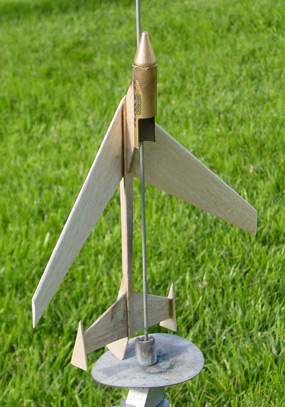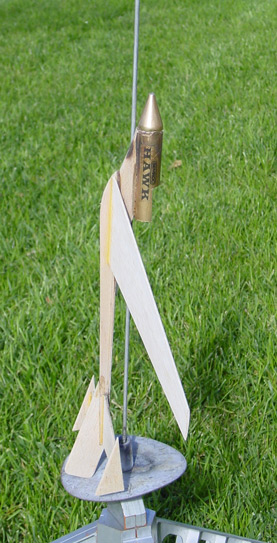| Construction Rating: | starstarstarstarstar_border |
| Flight Rating: | starstarstarstar_borderstar_border |
| Overall Rating: | starstarstarstarstar_border |
| Diameter: | 0.74 inches |
| Length: | 12.40 inches |
| Manufacturer: | Semroc  |
 Brief:
Brief:
Near reproduction of a boost glider (BG) kit from 1965 made by AMROCS. This is a forward motor BG which changes from
boost to glide by ejecting the motor casing, shifting its CG to the rear for gliding flight.
Construction:
This kit contains:
- (2) Balsa fin sheets - laser cut
- Nose cone - Balsa
- Motor mount 18mm
- Launch lug
- Decal
One thing was not clear and caused me a few moments of uncertainty was the two fuselage pieces are referred to as "halves." What is not made explicitly clear is that they are glued perpendicular to each other, not edge to edge. Rather than "halves," one could have been referred to as a "cross-piece" or "T-piece." A close inspection of the exploded drawing (which is great) does reveal this, but it is not, in my opinion, obvious enough.
I used a stationary belt sander to shape the airfoils on the wings. This went pretty well until I dropped one into the sander and ruined it. Luckily I had some identical balsa lying around and I made another wing.
Finishing:
For finishing I wanted to be as light as I could. All I did was sand everything down to 180 grit and paint the motor
mount and nose cone gold. Then I applied the single decal to the side of the motor mount. Some of the sanding would
have been better done before assembly but the instructions said to do it after, so I did. Some edges were impossible to
round after assembly. Oh well.
It was nearly in trim before I painted the nose. Then it needed some tail weight. I was able to trim it out by gluing a small brad nail to a corner in the stabilizer section. It would glide smoothly with a little left turn on a hand toss.
Construction Rating: 4 out of 5
 Flight:
Flight:
My three flights were a tribulation. Let me say that I believe that this is a really cool kit, but that mine was a
victim of excessive black powder ejection charges.
My first flight on an A8-3 looked good until it arced over, ejected and dove straight to the desert floor breaking off the tail section. Inspection showed the nose cone missing and the motor casing still in the motor mount.
After repairing the boom with epoxy and attaching a spare nose cone, I retrimmed the glider. Another A8-3 flight showed the same initial promise of a good boost. The ejection again occurred past apogee and this time the force of the ejection broke the boom just forward of the rear stabilizer assembly. Both pieces came fluttering to earth.
I finally got a glide on the third flight. This was a B4-2. It gave a very high boost - fairly straight up, thank goodness. The short delay had it ejecting while it still had some upward velocity and the boom did not break. The glide was a little steeper and not a long as I wanted, but that can be fixed for next time.
Recovery:
I do not recommend the A8-3 for this glider. The B4-2 worked well. With an appropriate adapter, a 13mm motor could be
used. If so, I would use the 2 second delay.
Flight Rating: 3 out of 5
Summary:
This should be a solid performer. I believe the design is sound. I had a bad experience with the A8-3's. I would use
the shortest delay possible. Epoxy the nose cone in place.
Overall Rating: 4 out of 5
Other Reviews
- Semroc Hawk By Tyler Jones (March 29, 2009)
Brief: The Hawk is a boost glider that uses a rocket engine to get itself in the air. It is a "Retro-Repro" of an older rocket. Semroc is selling them for $7.50 right now so I decided to pick one up. Construction: When I bought the kit I figured there wouldn't be very many pieces. I got it and found only 5 parts in the whole kit. It comes with: 1 BT-20J ...
- Semroc Hawk By Paul Morris (March 22, 2009)
Brief: A retro boost glider that was purchased for me by my nephew and niece for my birthday. This was the first model rocket that I have built since I had a stroke--and it proved a bit of a challenge. Construction: The kit comes in a bag and contains: motor mount 2 balsa sheets of parts balsa nose cone decal launch lug The balsa was light, ...
- Semroc Hawk By Matt Gillard (March 22, 2009)
Brief: A Retro-Repro production from 1965. The Hawk is a quick to build boost glider that ejects its motor and glides back down. Flies almost from the building board. Construction: Kit comes in a plastic bag and contains: 1 instruction booklet 2 3/32" balsa part sheets 1 BT-20 motor tube 1 Balsa nose cone 1 1/8" launch lug 1 Hawk decal ...
- Semroc Hawk By Robert Gustin (March 12, 2009)
Brief: The Semroc Hawk RetroRepro boost glider is a very simple to build and easy to fly rocket boosted glider. Based on the 1965 AMROCS Hawk, it ejects its motor to establish a stable, balanced glide. Construction: In the well packaged kit you get: 1 Instruction set 2 3/32" balsa part sheets 1 BT-20 motor tube 1 Balsa nose cone 1 1/8" launch lug ...
- Semroc Hawk By Jim Bassham (March 7, 2009)
Brief: This is Semroc's Retro-Repro kit of the 1965 AMROCS Hawk. It is a swept-wing boost-glider that uses motor ejection to change CG at apogee. Construction: The kit consists of a balsa nose cone, an 18mm motor tube, a launch lug, a waterslide decal, and two sheets of laser-cut balsa parts. The instructions in this Semroc kit were well written, logical, and generously ...
- Semroc Hawk By Hans "Chris" Michielssen (February 7, 2009)
Brief: I put my order into Semroc during their end of the year Christmas discount. My order was already over $40.00 and the Hawk was a free kit! I added an extra Hawk to my order. One to build, one to hoard. I had an AMROCS catalog in the early 1970s. I remember thinking it was a near twin to the Estes Falcon. With laser cut fins, this kit went together much easier than my ...
- Semroc Hawk By Chan Stevens (January 3, 2009)
Brief: The Hawk was originally introduced by Advanced Model Rocket Systems (AMROCS) in 1965. Its design is very much like the Estes Falcon. It's technically a boost glider, although it doesn't use a carrier vehicle, instead relying on ejecting the motor to handle the necessary shift in CG/CP relationship. This Semroc "retro repro" faithfully reproduces the original ...
 |
 |
Flights
 |
 |